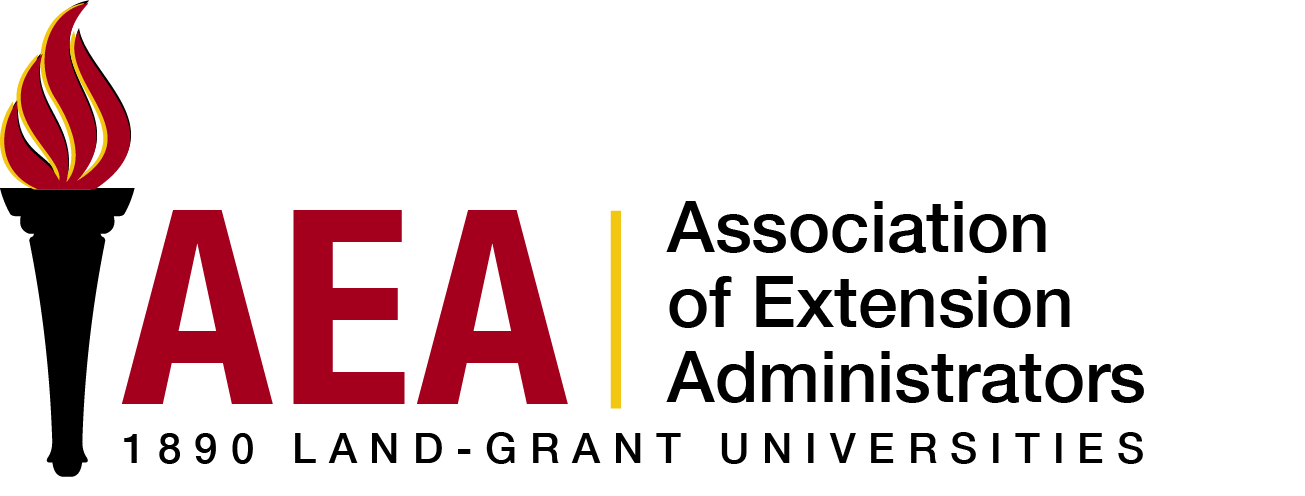Extension Today
News from and about the 1890 Land-Grant Extension SystemMessage from the Chair

Dr. Carolyn Williams Executive Associate Director, Prairie View A&M University
I hope your summer is eventful and rewarding. We are honored to share the impact of relevant procedures in agriculture and natural resources that address food deserts and food insecurity in our communities.
Throughout history, agriculture has played a significant role in the sustainability of humans. The crops we grow and the meat we consume originated from our hunter-gathering society. As generations moved toward the preindustrial revolution, a name was coined for a particular style of agriculture. Thus, the term "organic agriculture" was born as a natural way to farm and ranch with fewer effects on the environment, such as producing food and fiber without using chemicals or additives.
As we advance into a more technological society, new systems to feed people will emerge. Systems like aquaponics, hydroponics and lab-grown proteins are just a few to name. Though these advancements are needed, using the most basic natural resources to feed your family or farm will always be the basis of food production.
Establishing community gardens
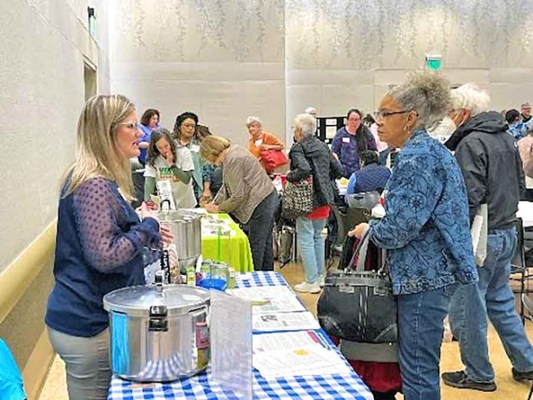
A community garden is a place where community members in urban, suburban or rural areas gather to manage open green spaces. These green spaces are used to grow fruits, vegetables or other plants and offer many benefits. For example, community gardens allow people access to fresh fruits and vegetables, a chance to engage in physical activity and the opportunity to enjoy the great outdoors.
Community Garden Expo
Earlier this year, the Alabama Cooperative Extension System’s home grounds teams at Alabama A&M and Auburn, along with funding partners (U.S. Department of Agriculture, Cawaco RC&D and the Birmingham City Council) coordinated a Community Garden Expo at the Birmingham Botanical Gardens. Approximately 142 people registered to attend from across the state. Topics included community gardening basics, such as forming a gardening committee, site preparation, plant selection, zoning and garden maintenance, for starters. Due to positive reviews, plans are underway to make the expo a regularly scheduled event. The next Community Garden Expo will be held in Madison County, Alabama, in 2024.
Community Garden Guide
In addition, a new publication titled “A Guide to Establishing a Community Garden” is now available to serve as a roadmap for individuals, groups and organizations that desire to start a community garden. Contact Extension Horticulture Specialist Dr. Rudy Pacumbaba at rop0001@aces.edu or (256) 372-4266 to get a copy. Look for the new publication online in July 2023 at www.aces.edu.
Organic crop production
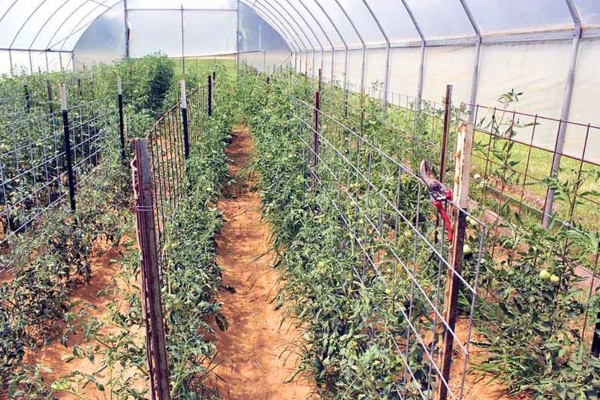
According to the U.S. Department of Agriculture (USDA), certified organic cropland acreage increased by 78% between 2011 and 2021. Marketing of organic produce claims numerous health benefits. Reported benefits of organically produced crops are reduced pesticide residue, increased levels of nutrients or beneficial compounds. Current evidence does not support any meaningful nutritional benefits compared to conventionally grown foods. However, organic production methods have been demonstrated to have a less detrimental impact on the environment.
Organic producers cannot use the term “organic” unless they are certified producers. Several states currently are “accredited” by the USDA to certify organic producers. These states must follow the regulations as established by the USDA’s National Organic Program (NOP). Each state with a certification program can require additional regulations if its environment or a specialized commodity needs further regulations. USDA publishes a list of private certifiers for states without a certification process.
Producers with less than $5,000 in sales of products are not required to be certified; they can use the term “organic” grown and the standards or rules established by the NOP. Non-certified growers can use terms such as naturally grown, pesticide-free or all-natural to market their produce. Home gardeners can grow organic crops but cannot sell produce as organically produced. For additional information, contact James Garner, Ph.D., farm manager at Alcorn State University.
Organic ag, climate change for small farmers in Delaware

In recent news, we have witnessed the effects of climate change in the form of intense weather patterns and drought conditions. Scientists have coined the phrase “climate migration” to define shifts in population density as the changing climate makes some regions of the U.S. less inhabitable.
Undoubtedly, climate change also has a direct impact on agriculture. Dr. Rose Ogutu, Extension horticulture specialist and Sustainable Agriculture Research and Education (SARE) coordinator for Delaware State University, is involved in work that amplifies this connection for small farm owners in Delaware. For the month of June, DSU Cooperative Extension showcases Ogutu and her work at the intersection of organic agriculture and climate change.
As a state Extension specialist and member of the Small Farms Program team, Ogutu routinely partners with 1862 land-grant colleagues at the University of Delaware and with experts from the Delaware Department of Agriculture and the U.S. Department of Agriculture’s (USDA) National Institute of Food and Agriculture (NIFA). She also partners with colleagues across disciplines within DSU Cooperative Extension. Her work involves finding solutions to challenges faced by Delaware’s under-resourced crop production farmers. Using the national Cooperative Extension model, Ogutu plans and executes community engagement and educational activities related to horticulture.
Destination: Florida grapes, wines
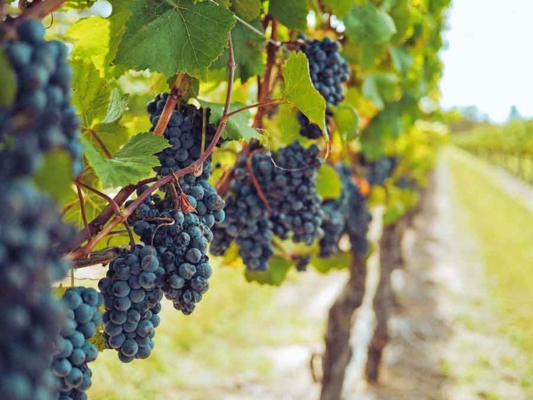
For 45 years, Florida A&M University’s Center for Viticulture and Small Fruit Research has carried out comprehensive research on the native muscadine grapes and serves as a vital resource for southern grape growers and winemakers. With 45 acres of research vineyards and a state-of-the-art research facility, the center maintains the largest collection of muscadine grape germplasm in the world and is one of the five National Clean Plant Centers for Grapes.
Three newly released patented grape cultivars: Floriana, Florida Onyx and Blanc du Soleil are the latest valuable addition to the fresh fruit and wine markets. Statewide Extension and continued education services are offered in the form of workshops, including the Vineyard and Wine Best Management Practices (BMP) in February and Winemaking Bootcamp held at the Florida Wine and Grape Growers Association (FWGGA) conference in January, all of which focus on vineyard establishment, pruning, disease management and winemaking topics.
In addition, the center’s Wine Analytical Lab offers a no-cost service for small growers and disadvantaged wineries and maintains the Digital Reference Database for Southern Wines. In August, the center’s annual Grape Harvest Festival is a highly anticipated tradition for the residents of Florida and the Tri-State Southern Region to learn more about the Florida wine and grape industry, the newest research and educational achievements, and entrepreneurial opportunities available.
Interested in grape growing and winemaking? Please contact us by phone at (850) 599-3996, by email at allen.humphries@famu.edu or follow us at www.famu.edu/viticulture.
Good Agriculture Practice training impacts Georgia farmers
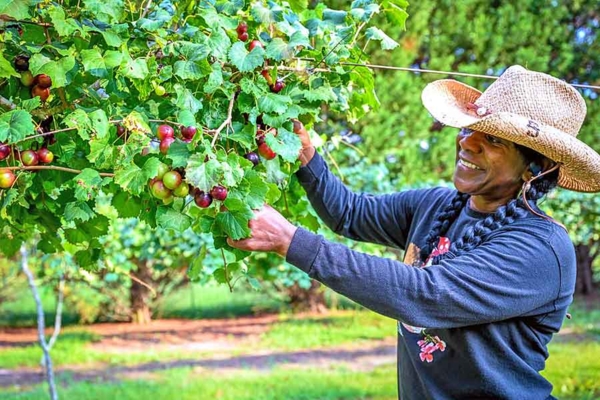
The Fort Valley State University (FVSU) Cooperative Extension Program (CEP) continues its effort in developing the Good Agriculture Practice (GAP) program on campus to benefit Georgia farmers.
According to Dr. James Brown, professor and interim program leader of agriculture and natural resources (ANR), FVSU’s Cooperative Extension received the U.S. Department of Agriculture (USDA) GAP certificate on Aug. 12, 2020, for the following fruit crops: blueberries, grapes and persimmons. He said FVSU’s aim is to train interested farmers and gardeners in the state of Georgia on how to become prepared to receive their GAP certificates to promote this good health practice throughout the state and beyond.
“The thrust of the CEP at FVSU is to help as many farmers and gardeners as possible in an effort to produce more healthy food products for human consumption,” Brown said. “The CEP ANR county agents are already training to extend the GAP initiative.”
In 2022, seven farmers received GAP training and certificates, while two are pending completion of training. Brown declared as time progresses, FVSU’s CEP will continue to train interested farmers who are willing to receive their certificates.
Working together for success
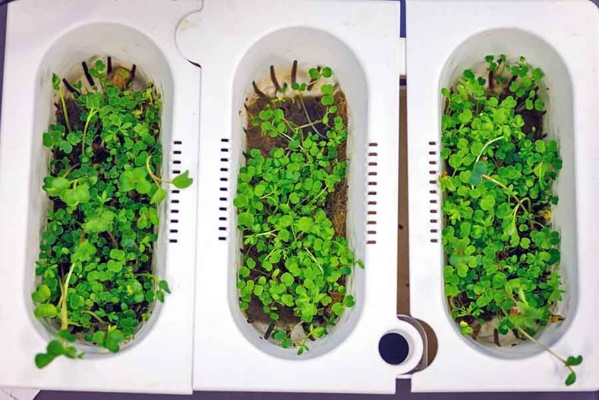
Kentucky State University staff recently helped establish aquaponics systems at Little Sandy Correctional Complex in Sandy Hook, Kentucky. The medium-security prison has a horticulture program for its inmates. After acquiring aquaponics systems, which grow plants with water and fish rather than soil, Little Sandy staff reached out to Kentucky State University, world-renowned for its aquaculture program.
“We partner with K State; K State was very helpful with getting it started,” said Steve Ison, regional education administrator at Little Sandy Correctional Complex.
Kentucky State University provided fish, helped with setting up the systems and educated the inmates about growing plants hydroponically.
“One of the things I love about it is that you can do it anywhere,” said Janelle Hager, aquaponics state specialist.
Little Sandy inmates have grown tomatoes, cucumbers, onions, herbs and especially lettuce — up to 16 heads a week. Working with aquaponics systems has given them new job skills they can use, as well as an opportunity to connect with the community, including local schools. Watch the full video at https://www.facebook.com/watch/?v=187711257034094. Also, to learn more about Kentucky State University’s aquaculture program, visit https://www.kysu.edu/academics/college-acs/school-of-ace/ag-res/division-of-aquaculture.php.
Cultivating specialty vegetable, spice crops for small-scale sustainable farming
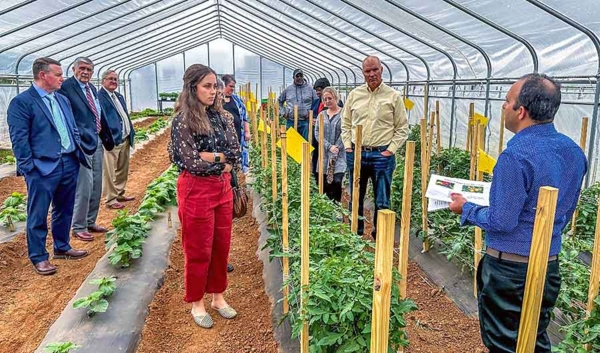
Langston University Sherman Lewis School of Agriculture and Applied Sciences (SL/SAAS) research and Extension activities are well known for providing services to socially disadvantaged communities and small-scale sustainable farming.
Recently, Langston University SL/SAAS opened phase one of the Horticulture Education Research Center [HERC: funded by a U.S. Department of Agriculture (USDA) Facilities Grant]. HERC houses a new greenhouse and two high tunnels to address the research and Extension needs of small to mid-scale vegetable, spice and fruit growers in the southern United States. Cultivation of warm-loving vegetables such as tomato and eggplant during spring-summer seasons in the open field in Oklahoma is challenging as cold and frost hamper the early planting in spring. Extreme heat during flowering and fruit set during summer months limits productivity. Furthermore, insect pests and disease pressure are high in open-field cultivation. As a result, there is low productivity with a higher cost of cultivation per unit area.
On the other hand, Oklahoma imports fresh vegetables from foreign countries or other states. However, imported “fresh” vegetables must be picked green and trucked long distance to arrive on the grocery shelf undamaged. As a result, consumers are increasingly discontented with the flavor and quality. In this context, locally grown fresh produce can appeal to consumers and can obtain a high premium price. Dr. Devi Kandel, assistant professor of horticulture (LU-SL/SAAS), and his HERC team are addressing the above issues through the cultivation of specialty crops in cost-effective high tunnel conditions.
Developing alternative aquaculture species, production strategies
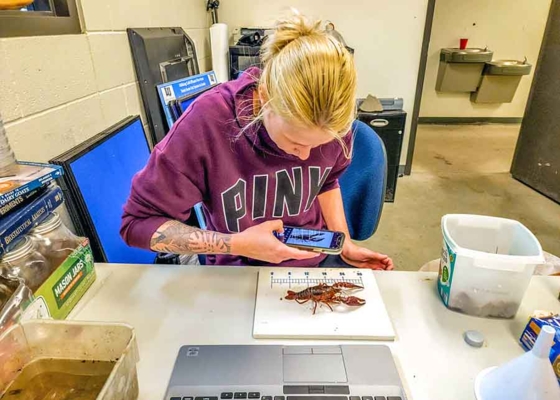
With varying climates across the United States, plants and animals we farm for food are often restricted in production by region. The possibility and capability of growing certain fruits and vegetables in California would not meet the same expectation if grown in Vermont. The foods we thrive on and enjoy are most often grown or raised in a habitat best suited for their specific health and general well-being. Otherwise, they would be “like a fish out of water.”
Yet, through research and experimentation, scientists are now discovering new ways to provide the proper nutrients and climate conditions needed for successful growth and viability. At Lincoln University of Missouri, two Cooperative Extension aquaculture professors are at the forefront. Lincoln University of Missouri will be the only institution in the entire country that will be analyzing the phosphorus, nitrogen and carbon budgets (balances of the nutrient cycles) of monoculture and polyculture systems of freshwater prawns and bass in earthen ponds.
Cooperative Extension helps Durham residents transform former plantation into a thriving community garden
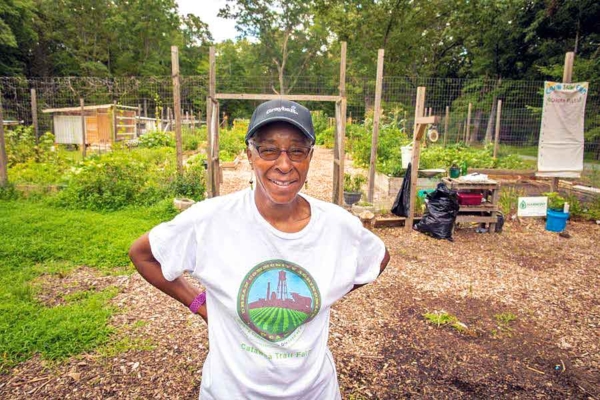
Technically, Delphine Sellars is a retiree, but to say she keeps busy is a vast understatement.
“When I retired in 2016, I wanted access to land,” recalled Sellars. “I wanted a space where people could come together, learn, raise crops and really feel close to the land.”
At the time, Sellars was a member of the Triangle Land Conservancy Board of Directors, and the group gave her new nonprofit called Urban Community AgriNomics (UCAN) access to an old farmstead known as Snow Hill IV Plantation in north Durham. Sellars and a small group of volunteers, including her sister, Lucille Godley Patterson, began the hard work of clearing the land and either restoring or disassembling old buildings in 2018. They renamed the site Catawba Trail Farm and harvested their first crops that summer. Today, the farm is a bustling community agriculture center with 47 raised garden beds rented and maintained by community members, a children’s garden, chickens that produce about 18 eggs a day, bees, fruit trees, and historic buildings that preserve the history of the farm and provide shelter, storage and meeting space.
Sellars has secured a wide range of community funding for the site, including a stipend from the community gardening program at Cooperative Extension at N.C. A&T to enhance COVID-19 safety measures and provide technical support to gardeners.
Soil scientist leads high tunnel production, chickpea research at SC State farm
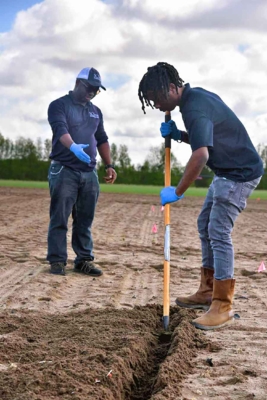
SC State University 1890 Research & Extension agronomist, Dr. Nana Kusi, will research various emerging crops to expose marginalized farmers to sustainable growing measures and best practices to enrich soil and crop production.
As an agronomist, Kusi will coordinate efforts that support farm sustainability and production through the construction of high tunnels at the university’s Research & Demonstration Farm in Olar, South Carolina. With two high tunnels constructed and three additional looking to be added, Kusi will examine methods that support season-long production for farmers and later transfer that information to farmers through Extension programs.
In addition, Kusi will conduct chickpea research to discover how the crop can be grown and used to benefit society. According to Kusi, chickpeas are in high demand in the United States, and he believes South Carolina farmers have an opportunity to meet that demand.
“Chickpeas are mainly grown in the Middle East and India; however, chickpea production in those countries is slowly declining,” Kusi stated. “The U.S. is a major consumer of chickpeas, a delicious and nutritious legume. By tapping into such a lucrative industry, I trust that South Carolina will be ahead of the game; however, research is necessary.”
For more information, contact Kusi at nkusi@scsu.edu.
Promoting resilience, food security, economic development
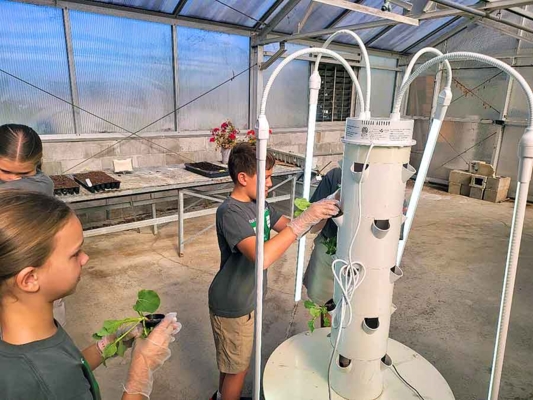
Louisiana faces unique agricultural and environmental challenges, including land loss, water scarcity and vulnerability to climate change impacts. Community aquaponics Extension programs offer a viable solution to these challenges by harnessing the synergistic relationship between aquaculture and hydroponics, enabling communities to grow fresh produce and fish in a controlled, resource-efficient manner.
The Southern University Ag Center’s Cooperative Extension JAG Pathway for Louisiana Agricultural Environmental Stewardship (P.L.A.C.E.S.) program focuses on building resilience and diversifying food production and reducing dependence on external inputs. This program will enhance community resilience to natural disasters, disruptions in the food supply chain and changing environmental conditions.
Incorporating aquaponics systems that can operate year-round will provide a consistent supply of nutritious food, even in challenging weather conditions or limited land availability. In addition to resilience and food security, the JAG P.L.A.C.E.S. program will support entrepreneurship and local food production.
The program seeks to stimulate economic development within communities, create opportunities for small-scale farmers, urban growers and entrepreneurs to participate in the emerging aquaponics industry, and will serve as an educational platform, providing training and skill development for individuals interested in sustainable agriculture, aquaculture and entrepreneurship.
For additional information about the JAG P.L.A.C.E.S. program, contact Dr. Marlin Ford, assistant director for plant research/research assistant professor and urban agricultural specialist, at marlin_ford@suagcenter.com.
TSU organic agriculture develops vegetable management practices
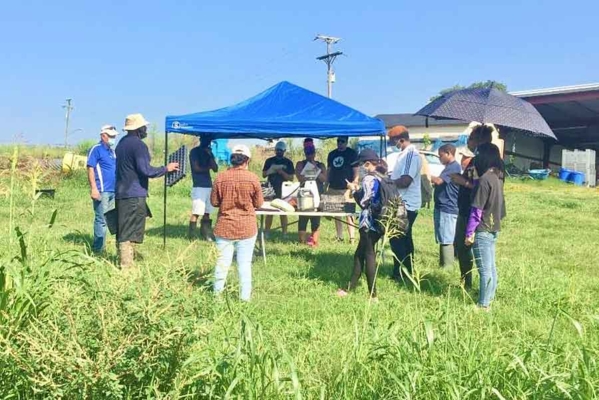
Tennessee State University has a robust organic agriculture management research and Extension program to understand how to grow organic vegetables in the hot and humid climate of the southern United States. Over the last 10 years, the university’s certified organic farm in the heart of Nashville has been home to several vegetables, as well as root and tuber crops. When grown on the farm, these crops are evaluated for cultivar trials, tolerance to pests and diseases, weeds, plant growth and yield.
Following the research trials conducted on the campus organic farm, TSU’s organic specialist, Dr. Dilip Nandwani, holds training workshops for new farmers, in-service trainings for Extension agents, field days, farm tours and host growers’ conferences. In addition to these efforts, Nandwani has produced 263 publications regarding organic vegetable growth, including journal articles, conference presentations, books and Extension fact sheets.
Nandwani’s research and Extension efforts in organic agriculture aid Tennessee farmers in meeting the rising demand for organic food in the southern United States by identifying and promoting organic farming practices, identifying production challenges, providing professional and efficient organic certification processes, and identifying risks associated with organic farming.
Tuskegee University’s organic agriculture research receives $2 million
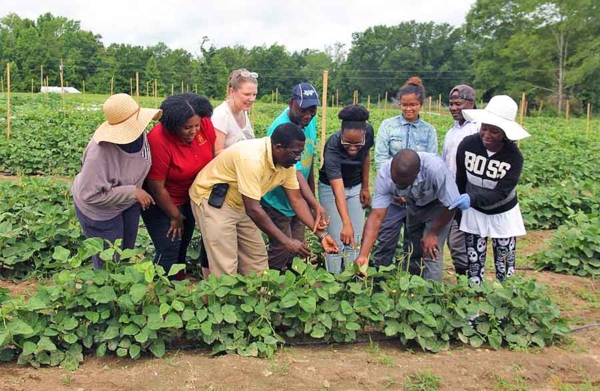
The College of Agriculture, Environment and Nutrition Sciences (CAENS) at Tuskegee University has set the standard for outstanding research, and it is the same for the Organic Agriculture Program.
For several years, Tuskegee University (TU) led the Southeast Organic Consortium, which provides organic farmers with research information and promotes and strengthens organic farming infrastructure in the southeast.
Now, TU is partnering with the U.S. Department of Agriculture's (USDA) National Organic Program (NOP) to deploy a systems framework for classroom and field-based organic agriculture education as part of the NOP’s Human Capital Development Initiative. As a result of the work that is being done by the organic project team (Drs. Kokoasse Kpomblekou-A, Desmond Mortley, Youssouf Diabate, Adelia Bovell-Benjamin and Franklin Quarcoo), CAENS has received $2 million from Clif Bar & Company, which was the first Historically Black College and University (HBCU) to receive a Clif Bar endowment and is the fifth recipient in the company’s $10 million program to support organic research at land-grant universities.
The endowment was matched by the Foundation for Food & Agriculture Research (FFAR), a nonprofit organization that builds public-private partnerships to fund research addressing challenges in food and agriculture, doubling the gift to $2 million.
UAPB supports state, national sweet potato production
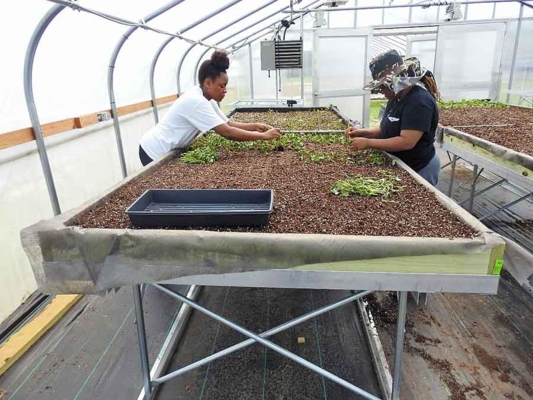
Sweet potatoes are propagated by stem cuttings, which makes the crop more susceptible to virus accumulation over time. More than 30 viruses are known to affect sweet potatoes. These viruses do not affect human health. However, the use of virus-infected slips for subsequent seasons can have a profoundly negative effect on a farmer’s operation, decreasing yield potential and profitability.
“The University of Arkansas at Pine Bluff’s Sweetpotato Foundation Seed Program works to supply high-quality, virus-indexed planting materials to farmers in Arkansas and the southern region,” Shaun Francis, Extension horticulture specialist for the UAPB School of Agriculture, Fisheries and Human Sciences, said. “The program includes a state-of-the-art biotechnology lab that allows researchers to develop and multiply virus-indexed sweet potato slips (planting materials) for use in the production of high-quality sweet potato seed stock.”
During the 2022 planting season, UAPB helped propagate 2,112 tissue culture, virus-free sweet potato plants that were used to provide approximately 41,200 slips to Arkansas farmers. The university’s Extension staff worked with a network of 13 commercial growers, supplying them with virus-indexed sweet potato slips and technical assistance. The UAPB program is responsible for approximately 90% of the acreage under sweet potato production in Arkansas.
“Through this program, a commercial grower in Arkansas planted 9 acres using UAPB virus-indexed generation zero (G-0) slips,” Francis said. “The first generation (G-1) roots harvested from this acreage will be used as seed material for the 2023 growing season.”
ALEI offers educational resources on how to transfer a shellfish aquaculture lease
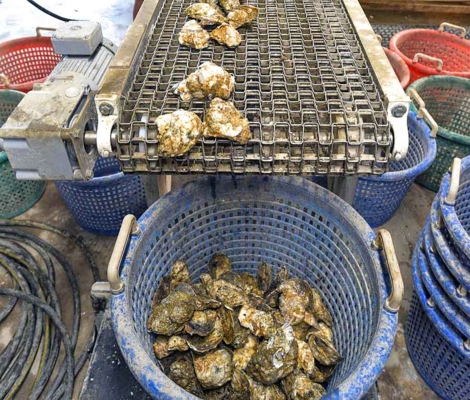
Last month, the Agriculture Law Education Initiative made resources available on its website on the steps to transferring a commercial shellfish aquaculture lease, along with the reasons and timing to do so. ALEI is a collaboration of the School of Agricultural and Natural Sciences at the University of Maryland Eastern Shore (UMES), the University of Maryland Francis King Carey School of Law at the University of Maryland, Baltimore and the College of Agriculture & Natural Resources at the University of Maryland, College Park.
“A shellfish lease is not inheritable and can’t be passed down to the next of kin through a will or estate,” said Nicole Cook, an environmental and agricultural faculty legal specialist with UMES Extension. “Being able to transfer a lease to a business entity or a co-leaseholder can offer some assurance of lease continuity. The transfer process can also be used to remove a co-leaseholder that may come about with changes in a business partnership or family relationships.”
ALEI, Maryland Sea Grant and Maryland’s Department of Natural Resources teamed up to make available a shellfish aquaculture lease transfer fact sheet to be used in conjunction with an online webinar recording. The educational resources are intended to provide “helpful, step-by-step” information to assist leaseholders.
“The ultimate goal is to help sustain Maryland’s aquaculture industry,” Cook said.
Virginia Cooperative Extension at Virginia State University revamps its aquaculture program
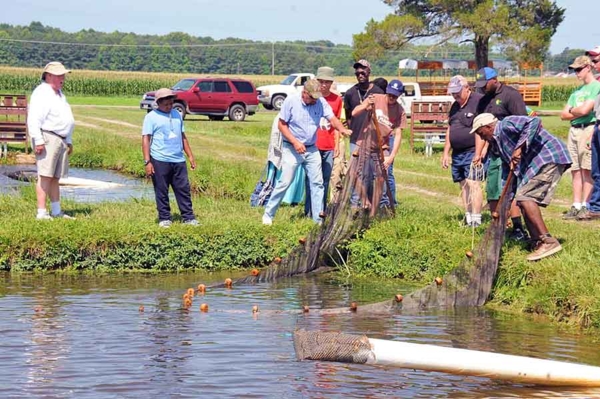
After 30 successful years in aquaculture, Virginia Cooperative Extension at Virginia State University is reassessing how best to address the current needs of producers in the growing industry. As one of two land-grant universities in the commonwealth, VSU-VCE advises limited-resource producers about aquaculture opportunities and best practices.
Dr. Nicholas Romano, associate professor, and Extension specialist and coordinator, took the helm of the VSU-VCE program as the aquaculture team leader after the retirement of two of the program’s aquaculture experts. With expertise in sustainable aquaculture, Romano specializes in fish nutrition, aquaponics, pond management, black soldier fly larvae and biofloc (a fish-farming system that recycles waste nutrients as fish food).
Romano explains that cheaper imports and large-scale production of catfish in some southern states make it difficult for small-scale producers in Virginia to compete. Moreover, pond aquaculture is not feasible for everyone, especially for those in urban areas or with limited resources. However, it is still possible for limited-resource farmers to produce highly marketable products with low startup costs. To assist these farmers, Romano plans to upgrade facilities, add staff, conduct workshops for farmers and collaborate with the Agricultural Research Station at VSU to ensure science-based best practices are applied.
Virginia Cooperative Extension extends the resources of Virginia's two land-grant universities, Virginia State University and Virginia Tech, to solve problems facing Virginians every day.
Charleston’s west side community grows through urban garden
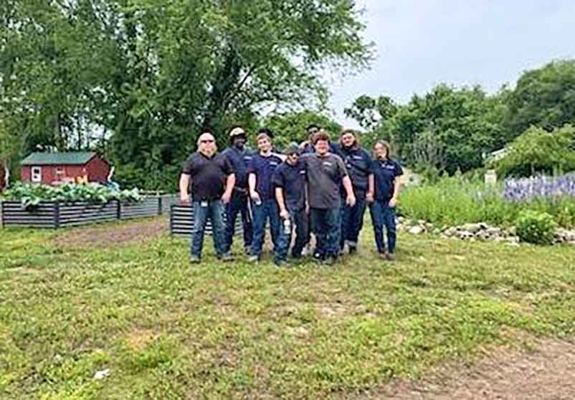
Rebecca Street Urban Community Garden was started by Tom Toliver as an attempt to bring fresh produce to the west side of Charleston. West Virginia State University (WVSU) established an education center onsite and installed a high tunnel in 2019 to help extend the growing season and improve plant health and quality.
Through the WVSU/Rebecca Street partnership, WVSU Extension Agriculture and Natural Resources (ANR) has created a series of workshops to demonstrate how to care for a community garden, including how to plant in-raised beds and management practices. Workshop participants seeded, transplanted and planted the grounds in May.
WVSU Extension has also partnered with WV JobCorps to help maintain the gardens. Partners have been meeting once a week to perform maintenance and upkeep, including winterizing, mowing and replacing all raised beds, which has added 320 square feet of growing space.
“Collaborations such as this are important because they allow for different programs to support one another and build lasting knowledge and relationships,” said Eden Clymire-Stern, WVSU ANR Extension educator. Workers have dedicated more than 800 hours of community service to the Rebecca Street Community Garden this year.
